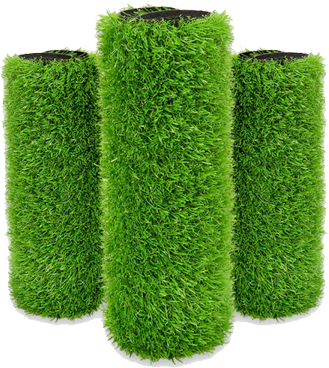Keeping a natural lawn neat is a constant battle with mowing, watering, and weeding. Artificial grass takes away most of that work, but it still benefits from simple, regular care to stay fresh and last for years.
At Superior Lawn, we’ve installed and maintained thousands of artificial lawns in London. Even the best artificial grass installation looks its most vibrant when you follow a straightforward cleaning routine.
In this guide, you’ll learn everything about artificial grass cleaning and maintenance, from the best way to clean it and how often to schedule a washing routine for artificial grass, to dealing with fake grass for dogs, stains, and seasonal challenges.
- So… Is Artificial Grass Truly Safe for Children?
- What Makes Artificial Grass Safe for Children?
- How to Create a Child-Safe Artificial Grass Play Zone
- FAQs: What Every Parent Wants to Know
- Can kids play barefoot on artificial grass?
- Will artificial grass give my child rug burns?
- What if my child spills food or gets sick on the grass?
- Is it safe for babies and toddlers?
- Does artificial grass smell?
- Is it safe under the playground equipment?
- Will it help with allergies?
- Does artificial grass get too hot in summer?
Table of Contents
ToggleWhy Cleaning Artificial Grass Matters
Artificial turf is famously low-maintenance, but it still benefits from regular attention. A simple cleaning routine keeps your lawn:
- Fresh and Hygienic: Clearing pet waste, pollen, and everyday dust stops bacteria and odours from building up.
- Vibrant and Upright: Brushing lifts the fibres to prevent flattening and fading from sunlight or heavy foot traffi
- Free-draining and safe: Removing debris and moss keeps water flowing through the base, avoiding puddles and slippery patches.
Skipping these steps might not show immediate damage, but over tim, it can shorten the life of your turf and lead to costly repairs.
With just a few minutes of care each week and seasonal checks, your synthetic lawn can stay lush and natural-looking for well over a decade, delivering the same fresh green look as the day it was installed.
Trending Read: How Much Does Artificial Grass Cost in London? 2025
How Often Should You Clean Artificial Grass?
The ideal cleaning schedule varies with how you use your garden and the local climate. Here’s what we recommend based on years of artificial grass maintenance experience:
- Weekly Light Clean – Brush or blow away leaves, twigs, and dust. A quick rinse with a garden hose keeps the surface fresh and helps prevent moss or algae.
- Monthly or Bi-Monthly Deeper Clean – If you have children, pets, or heavy foot traffic, spend extra time on spot cleaning and lifting the fibres with an artificial grass maintenance brush.
- Seasonal Checks – Before wet winters or pollen-heavy springs, inspect seams and drainage, and remove any built-up debris.
Tip: In rainy climates, natural showers often give your lawn a free rinse. Even so, a gentle brush afterwards keeps fibres upright and avoids compacted dirt.
By following this simple timetable, you’ll extend the life of your turf and keep it looking as vibrant as the day of installation, without adding significant work to your routine.
Step-by-Step Guide to Cleaning Artificial Grass
With just a few basic tools and a little time, you can keep your synthetic lawn looking as good as new. Follow these four simple steps recommended by Superior Lawn for long-lasting artificial turf care.
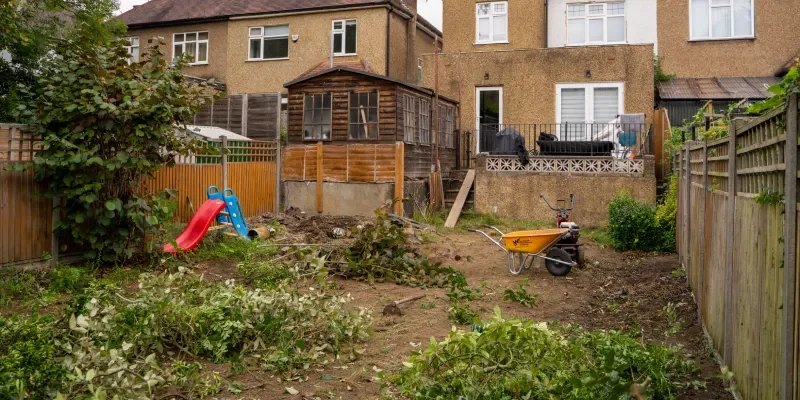
Step 1: Remove Loose Debris
Begin by clearing away leaves, twigs, and any litter that has gathered on the surface. A soft broom, plastic rake, or leaf blower all work well. Take a few extra minutes to check corners, edges, and around garden furniture where debris tends to collect.
This first clean is more than cosmetic. Organic matter breaks down into fine particles that can block drainage or create nutrients for moss and weeds. Removing it early prevents problems and keeps the base layer free-draining.
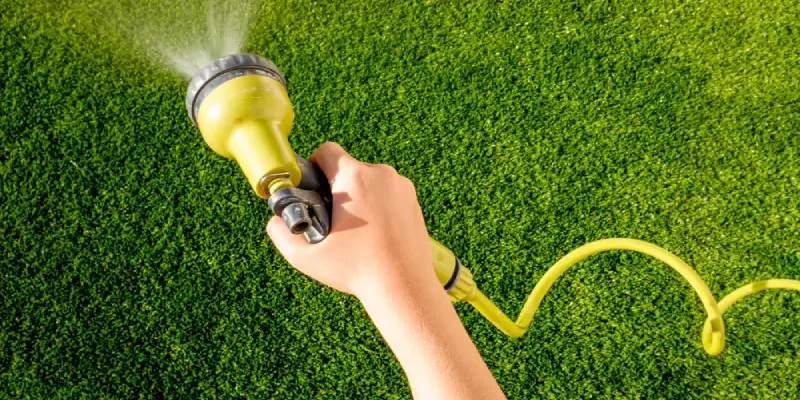
Step 2: Rinse with Water
Next, give your artificial grass a gentle rinse. A garden hose set to low pressure is all that’s needed. Avoid strong jets or pressure washers, which can flatten the fibres. Work methodically across the lawn so dust, pollen, and tiny particles are washed through to the drainage layer.
If you live in a region with regular rainfall, nature will handle some of this cleaning for you. Even so, an occasional rinse keeps the surface consistently fresh and helps prevent odours, especially if pets use the lawn.
Step 3: Spot Clean with Mild Detergent
Spills and light stains, such as drinks or muddy pawprints, may need a little more attention. Mix a small amount of gentle household soap or diluted vinegar with water, apply it to the mark, and let it sit briefly.
Use a soft brush or cloth to lift the residue, then rinse thoroughly so no soap film remains.
This light wash doubles as a natural artificial grass disinfectant, leaving your lawn hygienic and safe for children and pets. Regular spot cleaning also prevents discolouration and keeps the grass looking freshly installed.
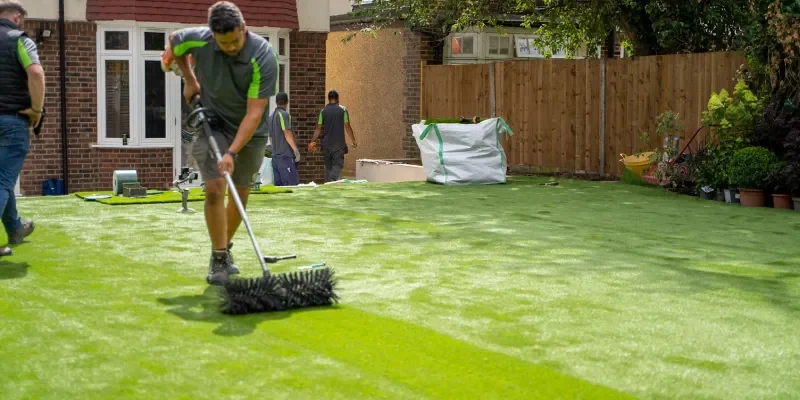
Step 4: Brush the Fibres Upright
Finish by brushing the turf against the grain. A stiff broom, power brush, or dedicated artificial grass maintenance brush is ideal.
Brushing lifts flattened blades, redistributes the infill evenly, and restores that natural, springy appearance.
This final step is key to good synthetic grass maintenance. It keeps the surface soft underfoot, encourages even drainage, and gives your lawn the same lively look it had on the day of installation.
Related Read: 5 Best Ways To Maintain Your Artificial Grass Lawn
Dealing with Common Artificial Grass Issues
Even with regular cleaning, everyday life brings spills, changing weather, and other surprises. Here’s how you can handle the most common situations to keep your artificial lawn spotless and long-lasting.
Pet Waste
If your pets use the garden, remove solid waste as soon as possible—just as you would on a natural lawn. Give the area a gentle rinse with a garden hose to wash away any residue.
For extra freshness, apply a pet-safe synthetic grass cleaner or mild artificial grass disinfectant. This quick routine keeps the surface hygienic and free of lingering odours.
Spills and Sticky Substances
Spilled drinks, chewing gum, or candy should be tackled promptly. First, cool sticky spots with ice to harden them. Then lift the residue carefully with a plastic scraper or dull knife.
For drink stains, lightly scrub with warm water and a small amount of gentle soap, then rinse thoroughly. Acting quickly prevents marks and keeps colours bright.
Weeds and Moss
A professional artificial grass installation includes a weed-control membrane that blocks most growth. Occasionally, a stray weed or moss patch may appear, especially around the edges.
Pull these out by hand or spray a little diluted white vinegar. Clearing fallen leaves and organic matter also helps prevent new growth.
Ice and Snow
During winter, allow snow and ice to melt naturally whenever you can. If you need faster results, brush away light snow with a soft broom, working gently to protect the fibres.
Avoid salt or harsh de-icers, which can damage drainage layers and shorten the life of your turf.
Seasonal Artificial Grass Maintenance Tips
Every season brings its own challenges for an artificial lawn, but a little planning keeps your turf looking great all year.
During spring and summer, pollen and dust can settle quickly, especially in dry spells. Give the grass a light rinse with a garden hose every week or two to keep it fresh. On very hot days, a quick spray also cools the surface, making it more comfortable for pets and children to play.
In autumn, falling leaves and twigs are the biggest concern. Clear them promptly with a soft broom, plastic rake, or leaf blower. Removing organic debris before it breaks down helps prevent moss and keeps drainage running freely.
Throughout winter, check that your artificial grass drainage is working and remove only the surface layer of any heavy snow if needed. Let the rest melt naturally. Avoid using salt or chemical de-icers, which can damage the backing and infill over time.
A few quick checks during cold weather protect your investment and reduce the need for major cleaning later.
Also Read: How to Lay Artificial Grass (The Complete Step-by-Step Guide)
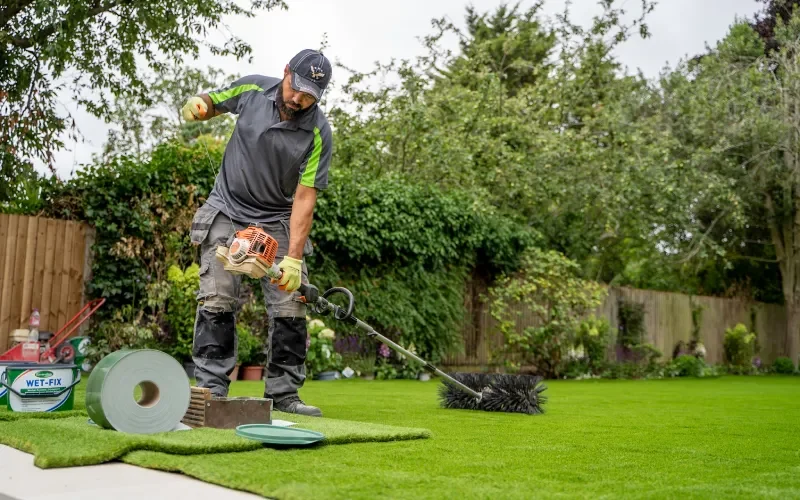
Essential Tools and Eco-Friendly Artificial Grass Cleaners
Keeping artificial grass spotless doesn’t require special equipment, but the right basic tools make the job faster and more effective.
- A soft-bristle broom or stiff brush is perfect for lifting fibres and redistributing infill after cleaning.
- A plastic rake or lightweight leaf blower quickly removes leaves and other loose debris without pulling on the turf.
- A garden hose with an adjustable spray is ideal for rinsing dust and washing away small particles. When a deeper clean is needed, use a mild, pet-safe detergent or diluted vinegar as a natural artificial grass cleaner.
These gentle options disinfect and refresh the surface without harming children, pets, or the environment.
We recommend setting aside a small cleaning kit with these items. Having everything on hand means you can tackle light maintenance in minutes, extending the life and appearance of your artificial lawn.
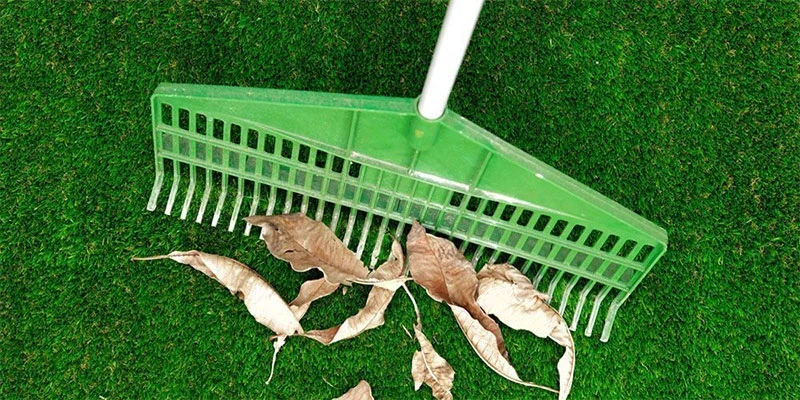
Common Artificial Grass Cleaning Mistakes to Avoid
A little regular care keeps your lawn in top shape, but a few missteps can shorten its life. Based on what we see at Superior Lawn, these are the most common issues to watch out for.
Avoid harsh chemicals and metal tools.
Bleach, strong solvents, or high-pressure cleaners can strip colour or weaken the backing. Likewise, metal rakes or wire brushes may tear the fibres. Stick to mild detergents, diluted vinegar, and soft-bristle or plastic tools designed for artificial grass maintenance.
Don’t let debris or spills linger.
Leaves, twigs, and food or drink spills break down over time, feeding moss and creating stains. Promptly clearing them keeps the surface fresh and prevents odours, especially important if you have artificial grass for dogs.
Check drainage and seams regularly.
Even well-installed lawns can develop minor issues. A quick look after heavy rain helps you spot poor drainage or lifting seams early, before they turn into expensive repairs.
With these simple habits, your synthetic grass maintenance routine will stay easy and your lawn will keep its just-installed look for years.
When to Call a Professional for Artificial Grass Care
Most homeowners can manage simple tasks like brushing, rinsing, and spot cleaning. But if your lawn has deep-set stains, compacted infill, or seams that have lifted over time, it may be a sign that the turf itself is nearing the end of its life.
This is where Superior Lawn can help. We specialise in premium artificial grass supply and professional installation, from reliable mid-range products to top-end luxury turf.
If your existing surface is worn or you’re ready for a complete refresh, our experts can remove the old lawn and fit a brand-new one designed to last for years.
Book a no-obligation survey and we’ll visit your property to assess the space, recommend the best type of artificial grass, and provide a clear, detailed quote.
Whether you need a tough, dog-friendly fake grass or a soft, natural look for a family garden, we’ll help you choose the right product and install it with precision.
Conclusion
A consistent routine, weekly brushing, monthly rinsing, and seasonal checks—will keep your artificial grass looking fresh and natural for many years. Simple habits like clearing debris quickly and using gentle cleaners mean less risk of moss, odours, or drainage issues.
Whether you prefer regular DIY upkeep or want the convenience of a professional deep clean, a little attention goes a long way.
Frequently Asked Questions related to Artificial Grass
How often should I clean my artificial grass if I have pets?
Pick up solid waste daily and give the area a quick rinse every few days. A more thorough wash once or twice a month helps prevent odours. This routine keeps artificial grass for dogs hygienic and fresh.
What cleaning products are safe for artificial grass?
Use mild, pet-safe detergent or a diluted white-vinegar solution. Avoid bleach, strong solvents, or anything with harsh chemicals, which can damage the backing and fibres.
How do I get rid of bad odours on synthetic lawns?
Rinse with water first. For persistent smells, especially in pet areas, spray a mix of water and vinegar or a specially formulated artificial grass disinfectant. These are safe for children and pets and neutralise odours naturally.
Can I vacuum artificial grass to remove debris?
It’s not recommended. Vacuums can pull up infill or damage the turf. A soft broom, plastic rake, or leaf blower is the safer choice for routine artificial grass cleaning.
How do I protect artificial turf during snow and ice?
Allow snow and ice to melt naturally whenever possible. For quicker results, gently brush off light snow. Avoid salt or chemical de-icers, which can harm the drainage layer and shorten the life of the turf.
Is professional cleaning necessary for artificial grass, or can I do it myself?
Most cleaning, brushing, rinsing, and spot treatment can be done yourself. If your lawn is badly worn or damaged, it may be time to consider a new artificial grass installation rather than a deep clean.
How long does artificial grass last with proper maintenance?
Quality artificial turf supplied and installed by Superior Lawn typically lasts 10–15 years or more. Regular light cleaning and seasonal checks will help it stay vibrant and functional for its full lifespan.



